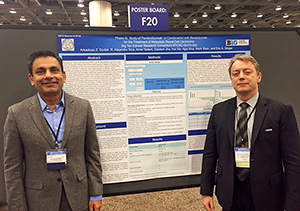Feb. 1, 2016:
Investigators within the Big Ten Cancer Research Consortium recently presented results from the Phase Ib portion of the BTCRC-GU14-003 study, establishing the maximum tolerated dose of pembrolizumab and bevacizumab in combination for subjects with metastatic clear cell renal carcinoma after failure of at least one systemic therapy for metastatic disease.
In a poster session presented at the 2016 Genitourinary Cancers Symposium in San Francisco in January, investigators reported no dose-limiting toxicities or serious adverse events related to the study drug had been reported. The 200 mg fixed dose of pembrolizumab and 15 mg/kg dose of bevacizumab, both given every three weeks, was determined to be safe and recommended for a multicenter Phase 2 study that is ongoing. (See abstract.)

Gautam Jha, MD, (left) of the University of Minnesota, and Arkadiusz Dudek, MD, PhD, of the University of Illinois at Chicago, are pictured during the BTCRC-GU14-003 Phase Ib poster session at GU ASCO.
The Phase 2 portion of the study is currently open to accrual at University of Illinois Cancer Center, Indiana University Melvin and Bren Simon Cancer Center, Holden Comprehensive Cancer Center at the University of Iowa, University of Michigan Comprehensive Cancer Center, Michigan State University Breslin Cancer Center, Fred & Pamela Buffett Cancer Center (University of Nebraska), Penn State Cancer Institute, and Rutgers Cancer Institute of New Jersey.
BTCRC-GU14-003 is supported in part by a research grant from the Investigator-Initiated Studies Program of Merck Sharp & Dohme Corp. The opinions expressed in the paper are those of the authors and do not necessarily represent those of Merck Sharp & Dohme.
For more information about this study, visit the Big Ten CRC website, or clinicaltrials.gov (study #NCT02348008).
About the Big Ten Cancer Research Consortium: The Big Ten Cancer Research Consortium was created in 2013 to transform the conduct of cancer research through collaborative, hypothesis-driven, highly translational oncology trials that leverage the scientific and clinical expertise of Big Ten universities. The goal of the Big Ten Cancer Research Consortium is to create a unique team-research culture to drive science rapidly from ideas to new approaches to cancer treatment. Within this innovative environment, today’s research leaders collaborate with and mentor the research leaders of tomorrow with the unified goal of improving the lives of all patients with cancer.
About the Big Ten Conference: The Big Ten Conference is an association of world-class universities whose member institutions share a common mission of research, graduate, professional and undergraduate teaching and public service. Founded in 1896, the Big Ten has sustained a comprehensive set of shared practices and policies that enforce the priority of academics in the lives of students competing in intercollegiate athletics and emphasize the values of integrity, fairness and competitiveness. The broad-based programs of the 14 Big Ten institutions will provide over $200 million in direct financial support to almost 9,500 students for more than 11,000 participation opportunities on 350 teams in 42 different sports. The Big Ten sponsors 28 official conference sports, 14 for men and 14 for women, including the addition of men’s ice hockey and men’s and women’s lacrosse since 2013. For more information, visit www.bigten.org.














Subscribe to the Big Ten CRC Newsletter X
X Facebook
Facebook YouTube
YouTube